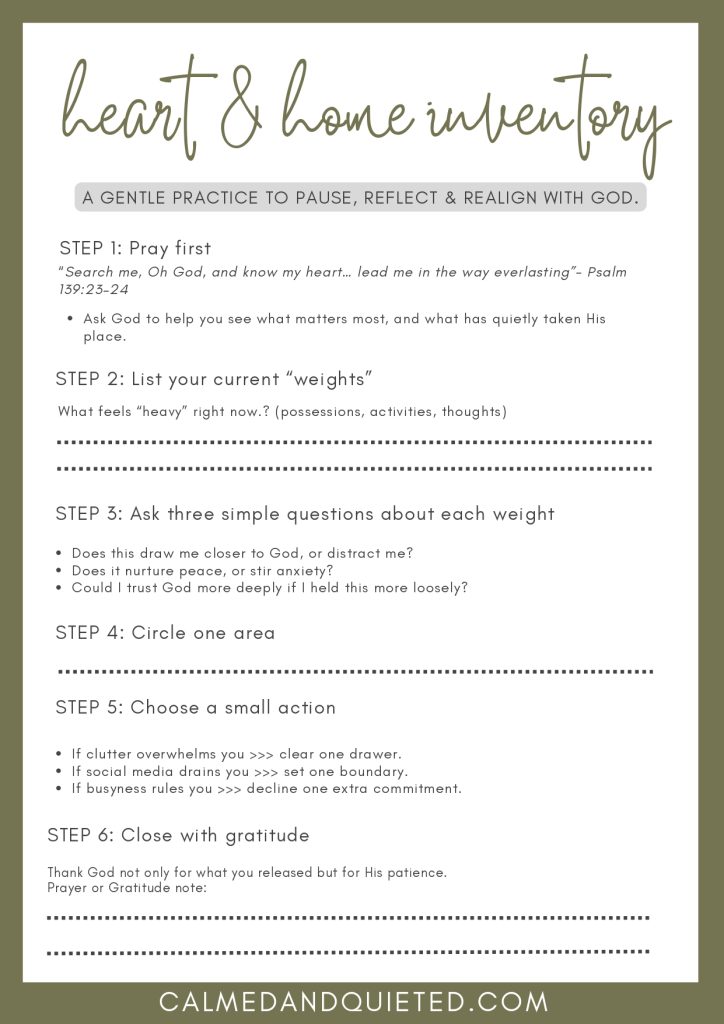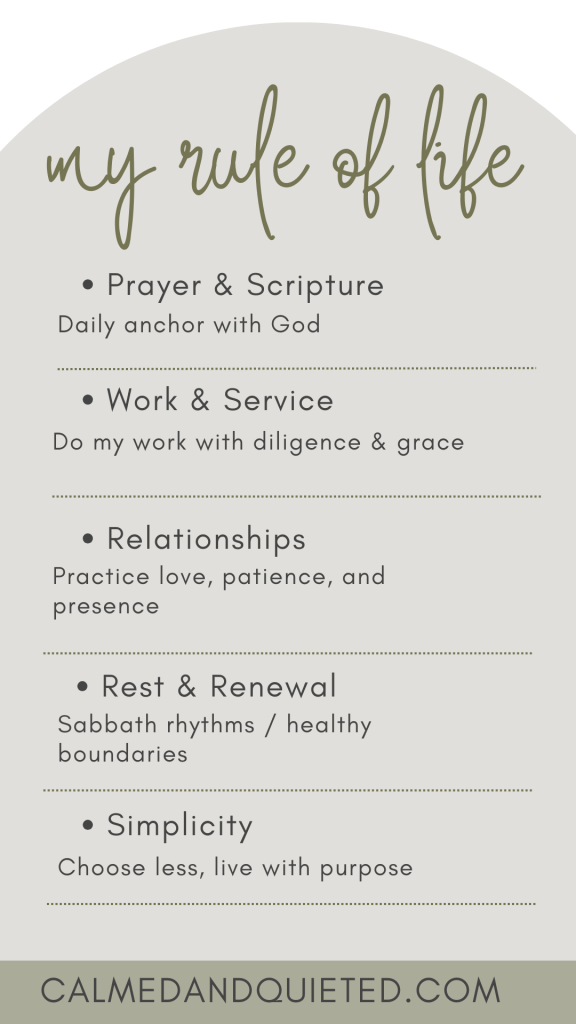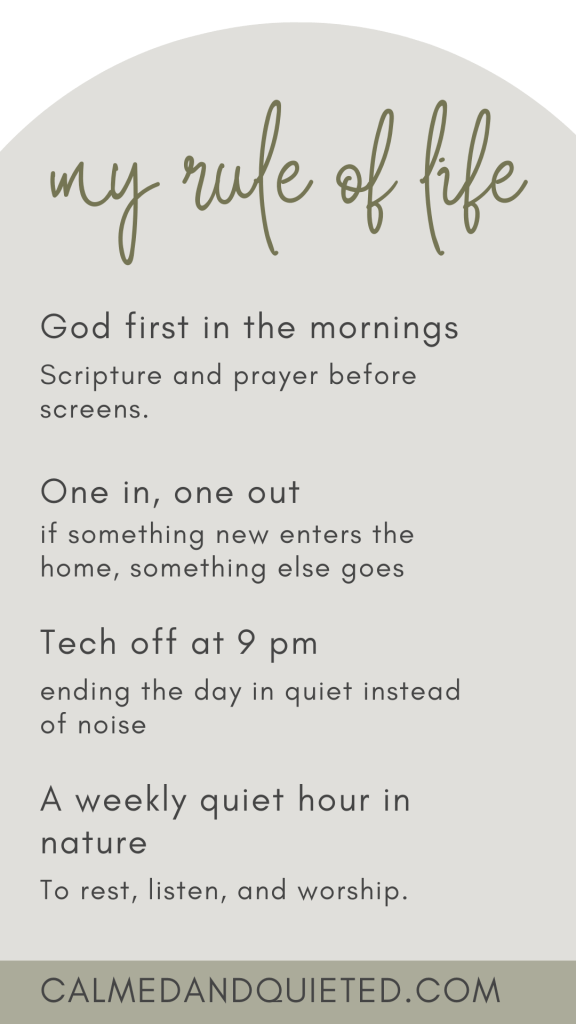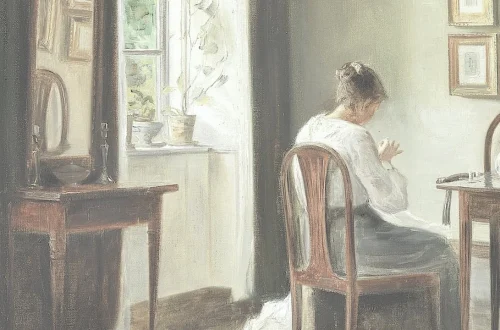
Christian Minimalism: A Biblical Guide to Living With Less (and More of What Matters)
In a world that tells us to want more, do more, and own more, many of us find ourselves stretched thin—spiritually dry, mentally exhausted, and weighed down by clutter in every corner of life. But what if less really could be more?
Christian minimalism isn’t about chasing an aesthetic or following trends. It’s about returning to God’s design for a simpler, lighter life—a life free from excess so there’s room for what matters most: prayer, peace, relationships, and faithful obedience.
This guide is for the overwhelmed woman who longs for space to breathe, clarity in her decisions, and a deeper walk with Christ. Together, we’ll explore what Christian minimalism looks like in practice, how it differs from secular minimalism, and how Scripture calls us to “lay aside every weight” (Hebrews 12:1) so we can run with endurance.
Inside, you’ll find not just principles but gentle steps you can take today: a heart inventory, a simple “Rule of Life,” and practical ways to simplify your time, home, money, and digital habits. Along the way, you’ll see how letting go of what drains you can open doors to spiritual renewal, financial freedom, and stronger, grace-filled relationships.
This isn’t about perfection. It’s about freedom. It’s about creating a life where your soul can rest in God’s presence and your hands are free to serve others.
Let’s walk this path of Christian minimalism together—toward less of what doesn’t matter, and more of what truly does.
What Is Christian Minimalism? (and how it differs from secular minimalism)
When people hear “minimalism,” they often picture stark rooms, capsule closets, and perfect countertops. That’s not the heart here. Christian minimalism is a spiritual-and-practical way of life that asks, What helps me love God and people well—and what quietly pulls me away? It’s less about counting items and more about clearing distraction so your days hold room for presence, prayer, and purposeful work.
At its core, this is intentional stewardship. We look at schedules, possessions, purchases, even digital habits, and ask a simple question: Does this help me glorify God—or weigh me down? Not in a guilty way. In a gentle, honest way that chooses freedom over clutter and peace over hurry.
This isn’t a new idea. It’s baked into God’s design. In Genesis, creation moves in a calm rhythm—work and rest—so life can flourish. Jesus traveled light, chose people over prestige, and taught contentment (think: “where your treasure is…”). In Acts, the early church shared what they had, prioritized prayer and fellowship, and made space for generosity. Simplicity isn’t a trend; it’s an ancient path back to first things.
🌿 Secular vs. Christian Minimalism
Secular Minimalism
- Focuses on aesthetics and design
- Values freedom from clutter for self
- Motivated by efficiency or productivity
- Goal: “Less stuff = more control”
Christian Minimalism
- Focuses on Christ, not aesthetics
- Values space for prayer and service
- Motivated by obedience and peace in God
- Goal: “Less stuff = more room for God”
This distinction matters. Secular minimalism can look beautiful yet still leave you restless. Christian minimalism aims at presence—with God, with people, and with the work you’re called to today. It’s perfectly okay if your home has color, your calendar has community, and your life has warmth. The goal isn’t bare; it’s better—a life ordered around what (Who) matters most.
╔══════════════════════════════╗
🌿 Grace note
Principles, not perfection. If all you do this week is create one quiet pocket of time or clear one small drawer, that’s still movement toward peace.
╚══════════════════════════════╝
A Biblical Foundation for Simplicity
Christian minimalism isn’t about rules or bare walls—it’s about aligning life with God’s wisdom for how we use time, possessions, and relationships. Scripture consistently points us back to principles that free us from distraction and point us toward God’s purposes.
Stewardship & Contentment
The Bible calls us to be wise stewards of what we’ve been given. “Enough” really is enough (1 Timothy 6:6–8). Resisting comparison allows us to find contentment and peace, no matter what others own or achieve.
Sabbath & Rest
From creation onward, God gave a pattern for time: work, then rest. The Sabbath is not wasted time, but holy space for worship, renewal, and trust (Exodus 20:8–10). Minimalism helps us recover that rhythm by removing the noise that crowds out rest.
Generosity & Hospitality
Simplicity creates margin—margin to love people well. With fewer distractions, we can share our homes, time, and resources more freely, echoing the early church’s spirit of generosity (Acts 2:46–47).
Wisdom & Focus
Like Mary at Jesus’ feet, simplicity helps us choose the “better portion” (Luke 10:41–42). It gives us the courage to say no kindly, so we can say yes to what God truly calls us to.
╔══════════════════════════════╗
🌿 Grace note
– Simplicity is a tool, not the goal.
– Focus on faithfulness, not minimal numbers.
-Progress matters more than speed.
╚══════════════════════════════╝
The Real Benefits of Christian Minimalism
For overwhelmed women, simplicity isn’t just about organizing closets—it’s about making space for peace, clarity, and faith. Minimalism meets some of the deepest struggles of modern life: busyness, anxiety, decision fatigue, financial strain, and even spiritual dryness.
Spiritual Benefits
Less clutter—both physical and mental—means more room for what matters most. Simplicity opens time and attention for prayer, church life, and service to others. It clears space to hear God’s voice without constant distraction.
>> Read more: Peace of God: How to Find it in a Busy World
Mental & Emotional Benefits
By reducing noise and decision overload, minimalism restores clarity and calm. Fewer possessions and commitments mean fewer demands pulling at your mind, helping to lower stress and anxiety.
>>Read more: How to Stay Calm Under Pressure
Financial Benefits
Simplicity helps rein in impulse spending, giving you momentum to pay down debt and use money more intentionally. Fewer purchases also mean less upkeep, freeing up resources for generosity.
Relational Benefits
When life isn’t overbooked, relationships thrive. Fewer commitments allow for deeper connections—with family, friends, and the church community. In short, less rush creates space for love.
>>Read more: How Gratitude to God Transforms Your Heart Daily
Start Here: A Gentle Heart Inventory
Sometimes the best way to begin is simply to pause and take stock. Not of closets or drawers yet, but of the heart. As Paul writes, “Examine yourselves, to see whether you are in the faith” (2 Corinthians 13:5). This kind of inventory isn’t harsh or judgmental—it’s gentle, guided by God’s Spirit.
Here’s a way you could approach it:
Step 1 – Pray first.
Begin with Psalm 139:23–24: “Search me, O God, and know my heart… lead me in the way everlasting.” Ask God to help you see what matters most, and what has quietly taken His place.
Step 2 – List your current “weights.”
Write down what feels heavy right now. Maybe it’s too many activities, maybe possessions, maybe even thoughts that replay endlessly. Don’t edit yourself—just list.
Step 3 – Ask three simple questions about each weight:
- Does this draw me closer to God, or distract me?
- Does it nurture peace, or stir anxiety?
- Could I trust God more deeply if I held this more loosely?
Step 4 – Circle one area.
Not five. Just one. Something you sense God is nudging you toward. Maybe it’s your phone habits, or your overflowing schedule, or the way you keep comparing yourself to others.
Step 5 – Choose a small action.
For example:
- If clutter overwhelms you, clear one drawer.
- If social media drains you, set one boundary.
- If busyness rules you, decline one extra commitment.
Step 6 – Close with gratitude.
Thank God not only for what you released but for His patience. Minimalism is not a race—it’s a walk with Him, one step at a time.
Download your Heart & Home Inventory

Your “Rule of Life” (Simple Priorities That Guide Decisions)
Christians throughout history have lived by something called a Rule of Life. That word “rule” doesn’t mean a strict list of regulations—it comes from the Latin regula, like a trellis that supports a growing vine. A Rule of Life gives gentle structure so your days can flourish in Christ instead of tangling in distractions.
Think of it as a few simple priorities that quietly steer your decisions. For some it may be written down; for others it’s more of an inner compass. Either way, the heart of it is the same: ordering life around what matters most to God.
Jesus expressed this in clear words: “But seek first the kingdom of God and his righteousness, and all these things will be added to you” (Matthew 6:33). A Rule of Life is simply a way of seeking first—in finances, in time, in relationships, in what we choose to own or let go.
A Rule of Life is simply a short, guiding framework that helps you make everyday decisions with clarity and peace. Think of it as a compass, not a checklist.
Here’s a sample you could adapt to your own season:
- God first in the mornings – Scripture and prayer before screens.
- One in, one out – if something new enters the home, something else goes.
- Tech off at 9 pm – ending the day in quiet instead of noise.
- A weekly quiet hour in nature – to rest, listen, and worship.
Notice, this is not about perfection. It’s about direction. A Rule of Life doesn’t box you in—it frees you from indecision. When a new opportunity or responsibility appears, you already have a framework to ask: Does this align with what God has called me to? Or does it pull me off course?
Download your Rule of Life card (phone-friendly)


Helpful reads:
Five Areas to Simplify (Step-by-Step)
a) Time & Commitments
Time is one of the most precious resources God gives us. Yet many of us stretch ourselves thin, trying to meet every demand and expectation. Jesus reminds us: “Come to me… and I will give you rest” (Matthew 11:28). Rest comes when we choose wisely what fills our days.
Quick wins: Start small. Cancel one non-essential commitment this week and notice the relief it brings. Keep a “later” list — tasks and opportunities that don’t need attention now but can be revisited in the right season. Try batching errands into one trip to free up hours and energy.
15-minute actions: Each Sunday, do a simple “Sunday Sweep” — glance at the week ahead, pray over it, and note the most important events. Each morning, set 3 priorities for the day instead of a never-ending list. Leave gentle buffers between commitments; margin helps you stay calm when plans change.
Watch-outs for singles: Without family obligations, it’s easy to over-commit in church, community, or friendships. Serving is beautiful, but beware of people-pleasing or saying “yes” out of guilt. Your rest matters too.
🌿 Weekly Priority Grid
>> Must-Do (urgent, essential)
>> Should-Do (important, flexible)
>> Could-Do (optional, if time allows)
When you place commitments into boxes, the overload becomes clearer. Time simplicity isn’t about doing everything better — it’s about doing fewer things with greater love.
B) Home & Possessions
Our homes are meant to be places of peace, not storage units for everything we’ve ever owned. Proverbs 24:3 reminds us, “By wisdom a house is built, and through understanding it is established.” Decluttering isn’t just about tidiness — it’s about creating space for what supports your calling and nourishes your soul.
Quick wins: Start with one drawer a day — a small win builds momentum. Use three bins labeled keep / offer / release to make decisions simple. Try the 10-item release challenge: each day, let go of ten items, whether they’re tossed, recycled, or donated. Small, steady steps add up.
Decision helps: When unsure, ask: Does it serve a purpose? Is it truly useful? Does it bring beauty or peace into my life? Does it align with my values? If not, bless it and let it go.
Spaces for singles: Many single women live with limited square footage — tiny kitchens, micro-closets, or shared apartments. This makes simplifying even more valuable. Focus on curating fewer but well-loved items, and use vertical storage or multi-purpose furniture to create breathing room.
🌱 Mini Decluttering Decision Tree
Do I use it regularly? → Keep
Does it bring beauty or peace? → Keep
If not… → Offer or Release
Each “yes” or “no” gently guides you to a home that feels restful and intentional.
C) Money & Buying
Money can either weigh us down with worry or become a tool for freedom. Simplifying how we handle our finances helps us live with less anxiety and more generosity. Proverbs 21:20 says, “The wise store up choice food and olive oil, but fools gulp theirs down.” A simple money plan protects us from impulse and points us toward peace.
Quick wins: Try the 24-hour wait rule before making non-essential purchases — you’ll be surprised how often the desire fades. Experiment with a “shopping fast” week to reset habits, using what you already have. And don’t underestimate the power of unsubscribing from promotional emails; less temptation in your inbox means fewer impulsive buys.
Budget basics: Keep things simple with three buckets — give, save, spend. Prayerfully decide a percentage for each, then let it guide every decision. You don’t need complicated spreadsheets to honor God and steward resources wisely.
Singles reality: Living on a single income often means being more intentional. Budgeting for seasonal splurges (like holidays or special outings) helps avoid guilt when those moments arrive. Also, plan for gifts — both giving and receiving — so generosity remains joyful rather than stressful.
Helpful reads:
D) Digital Life
Technology is a gift, but without limits it can easily take more than it gives. Constant notifications, endless scrolling, and comparison traps leave us restless and distracted from God’s presence. Psalm 46:10 reminds us, “Be still, and know that I am God.” Choosing boundaries with our devices is a way of protecting that stillness.
Quick wins: Start small by turning off non-essential notifications — your phone doesn’t need to buzz for every app. Switching your screen to grayscale can reduce mindless scrolling by making apps less “shiny.” Try a home-screen detox: move distracting apps off your main page so you see only what truly matters.
Boundaries: Create intentional rhythms of “tech-off” time, such as no screens before bed or during meals. Consider a Sabbath-style rest from social media once a week. Curate your follows so that what fills your feed encourages faith and peace instead of anxiety and noise.
Anxiety link: Notice when doomscrolling sneaks in. Instead of chasing headlines or endless posts, replace the reflex with a tiny, grounding habit: Scripture or outside. Even two minutes reading a Psalm or stepping outdoors to breathe fresh air can reset your heart and mind.
E) Mind & Emotions
Our inner life often feels like the busiest place of all. Thoughts race, decisions pile up, and emotions rise with every demand. Yet Scripture assures us that “the peace of God, which transcends all understanding, will guard your hearts and your minds in Christ Jesus” (Philippians 4:7). Cultivating simple rhythms for the mind and emotions creates space for that peace to take root.
Grounding practices: Small, repeatable actions can interrupt stress spirals. Try a breath prayer — inhale a phrase like “Be still” and exhale “and know You are God.” Each morning or evening, list three things you’re grateful for. When possible, take a short walk in nature; even ten minutes outdoors reminds you of God’s care and steadies your spirit.
Perfectionism & indecision: One source of stress is expecting too much from yourself. Define what “good enough” looks like in daily tasks — meals don’t have to be gourmet to be nourishing, and your home doesn’t have to be spotless to be welcoming. Create “decide once” systems: a weekly meal rotation, a handful of go-to outfits, or a fixed bedtime routine. These remove decision fatigue and free your mind for what truly matters.
Health & stress: Supporting your body helps calm your emotions. Gentle movement (like stretching or walking), staying hydrated, and building cues for restful sleep (dim lights, evening prayer) all nurture resilience and reduce anxiety.
Staying Consistent (When Life Gets Busy or You Feel Alone)
Starting a simpler, Christ-centered life feels refreshing at first. But over time, busyness creeps back, old habits return, and discouragement sets in. The key is not perfection but faithful persistence. Christian minimalism is a lifelong walk with God, not a one-time project.
Habit stacking & cue-based routines: Consistency grows when habits are attached to something you already do. For example, say a short breath prayer while you make coffee, tidy one drawer while dinner cooks, or set your Bible on your pillow each morning so you remember evening reading. These cue-based routines take little effort but add up to lasting change.
Monthly “lighten & align” check: Once a month, pause to ask: What feels heavy? What no longer fits my season? What one small step will bring me closer to Christ’s peace? This rhythm keeps simplicity alive without overwhelming you.
Supportive community: Walking this journey alone is hard. Share your goals with one accountability friend or join a small group at church. Community offers prayer, encouragement, and gentle correction when you drift.
Expect relapses, reset with grace: You will fall back into clutter, overcommitment, or comparison. That does not mean you’ve failed. Instead, use those moments as reminders to return to the Lord. A quick prayer — “Father, help me begin again with You” — resets your spirit. Grace, not shame, is the fuel for consistency.
Helpful reads:
- Change Starts Small: Bible Verses About Habits
- Gentle Strength in Quietness and the Spirit of Being Still
Staying consistent is less about rigid discipline and more about steady surrender. Every small step, every return to grace, deepens your walk in simplicity with Christ.
A Gentle 7-Day Starter Plan
Christian minimalism grows best through light, steady steps—never by trying to do everything at once. This 7-day starter plan is designed to give you a taste of simplicity in action. Each day asks for just a few minutes, yet opens space for peace and focus in Christ.
Day 1 – 10-Minute Heart Inventory.
Sit quietly with pen and paper. Ask: What’s weighing on me right now? Write freely, then offer your list to God.
Day 2 – Choose 3 Rule-of-Life Statements.
Write down three guiding priorities (e.g., “Sabbath rest each week,” “No phones at family dinner,” “Live within my means”). Keep them visible.
Day 3 – Tidy One Drawer + Release 5 Items.
Pick one small space. Remove five items you no longer use or love. Thank God for provision as you release.
Day 4 – Set Two Digital Boundaries.
Examples: no phone in the bedroom, or 30-minute limit on social media. Start gently, noticing how freedom feels.
Day 5 – Budget Buckets Sketch.
On paper, divide income into simple categories: needs, giving, savings, simple joys. Don’t overthink—just sketch.
Day 6 – 15-Minute Nature Walk.
Step outside without your phone (if possible). Walk slowly, noticing God’s creation with gratitude.
Day 7 – Mini Weekly Review + Prayer.
Look back: Which step felt lightest? Which brought joy? Thank God for progress and ask Him to guide your next week.
These steps are intentionally small—but together, they build momentum. Repeat them, expand them, or use them to shape your own rhythm of simplicity.
PIN ME FOR LATER!

Common Pitfalls & Grace-Filled Corrections
Christian minimalism is meant to bring peace, not pressure. Still, many of us stumble into traps that can steal our joy if we’re not careful. Thankfully, there’s always a gentler, grace-filled way forward.
The Legalism Trap.
It’s easy to treat minimalism like another set of rules: “I can’t buy this,” “I must declutter that.” When it starts to feel like law instead of life, pause. Remember—Jesus did not call you to rules, but to freedom in love. Minimalism is not about perfection, but about clearing space to walk more closely with Him.
All-or-Nothing Thinking.
Sometimes we feel we have to get it all right—or not try at all. The house has to be spotless, the budget flawless, the phone perfectly curated. When that pressure rises, practice this phrase: “One step lighter.” Instead of overhauling your life, just do one small thing that makes today a little more peaceful.
The Comparison Game.
Scrolling through beautifully minimal homes or Instagram feeds can make you feel behind. But minimalism isn’t about aesthetics; it’s about alignment. Instead of comparing, ask: “How can I serve one person today with the space and time I already have?” That shift grounds your heart in purpose, not perfection.
Declutter Regret.
Sometimes we donate something and later wish we hadn’t. To ease that fear, use a “quarantine box.” Place items inside and store them for 30 days. If you don’t reach for them in that time, you’ll release them with greater peace and confidence.
Minimalism becomes heavy when we carry it alone. But when we let grace lead, each misstep turns into another invitation to walk more lightly with God.
Closing Thoughts: Living Lightly in Christ
Christian minimalism isn’t about rules, perfection, or empty spaces—it’s about fullness. Fullness of peace, of joy, of trust in God’s provision. When we release the excess, we make room for His presence and for the people He’s placed in our lives.
Remember: this is a journey, not a destination. Some days will feel cluttered again, and that’s okay. Grace meets us where we are. What matters is that you keep turning your heart back to Christ and choosing simplicity, one step at a time.
If this guide has encouraged you, I invite you to bookmark it, share it with a friend, or explore more reflections here on the blog. And if you’d like, start small today—choose one thing to release, one quiet moment to give back to God, and let Him multiply the peace that follows.
May your life grow lighter, sweeter, and richer in what truly matters: Christ at the center. 🌿




